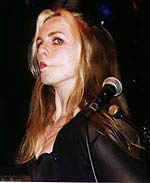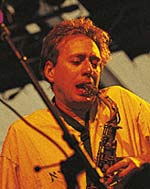The Seventies | |

| It's noon on a sunny Devon Sunday. I'm wondering whether we should go to the beach or out for a pub lunch or laze in the garden when the phone goes. It's my friend Tim, who excitedly tells me he's got me a Steely Dan ticket for Hammersmith that night. Great! Now I get the chance to drive all the way to London and back [I have to be back for my daughter on Monday morning; it's not a nursery day]; and I'd told him to phone me first before he did actually get any tickets, which are supposed to be impossible to get anyway. 'Oh go', says Sue, 'you'll enjoy it once you're there.' She's right, of course, though if you'd heard me swearing at traffic as we queued round Bristol, at the M25 turn-off, at the Heathrow turn-off and through Chiswick; or at the cassette player when it gave up working soon after Bristol, you might not have been so sure. By the time we get there [I give Tim a lift up; he's staying at his mother's for a few days, so I'm driving home alone] it's 7.30pm, and all our ideas of (a) parking right by the concert hall and (b) having time for a nostalgic riverside drink [we both went to school in Hammersmith] are abandoned. We park only half a mile away and head over to what we both know as Hammersmith Odeon but is now inexplicably the Hammersmith Apollo. It's still the same place though - I don't think they've cleaned the toilets since I was last there; the beer is still watery and expensive - although the upstairs bar is now bright pink, and there is a incredibly over-the-top camp announcer on the tannoy, eager to get us all to our seats before the band begin to play. Steely Dan have always been a difficult band to place, it seems. The erstwhile editor of Tangents screams if you mention progrock in his vicinity, but deep-down even he knows there is more to the 70s than punk, indie rock or progrock. Steely Dan seemed to combine paranoid storytelling with perfect pop, West Coast 'cool' jazz, 50s bebop, jazz funk, and the whole myth that is, or was, downtown New York in all its grimy, graffitied glory. Their interviews were always smartarse double-acts, they were renowned for spending years in the studio and being anally perfectionist; and everyone seems to hate them [though they sold millions of their records]. Mostly it seems to be the vocals which grate, closely followed by the smoothness and arranging, the production. Whatever, they just got on with it, banged a few albums out over the years and then split. After some solo stuff and a tour a few years back, a new album hit the stores this year and they're touring again. Bit of a greatest hits package really, it turns out, with some of the singing unwisely turned over to Walter Becker, the guitarist, who - let's face it - can't sing. The band are tight; too tight. The drummer is from the big jazz-funk 4-on-4-beat style of things, and the guitarist solos thru everything. Come to think of it there are two things which make it worse: firstly, the whole showbiz thing Becker & Fagen are playing at, introducing the band, being jolly, etc.; and, secondly, we have to endure a drum solo. Yup, a drum solo! I mean, this is why punk happened, to stop people banging things for 7 minutes trying to impress us. But the crowd lap it up, saddoes every one. I start to wonder if I'm in a time bubble and haven't yet left the sixth formÉ check to see my trousers aren't flared. They're not. Phew. Well, it got better. The new stuff, and the songs they played from their last few, great albums, suits the band, and there are no more drum solos. But maybe my 70s nostalgia is being eroded, I muse on the way home, trying to find something on the radio to keep me awake. Turns out Janice Long has been drafted to Radio 2 and given the graveyard shift: midnight-3am weekdays. I've never been a fan, but I have to say she did a great show, including a session from Sam Brown, who plays electric piano and sings some new songs in-between plugging her forthcoming tour, which - it appears - goes to Exeter. I make a mental note, then pay a bit more attention to the dark motorwayÉ |

| Two weeks later I'm sitting on the floor at Exeter Arts Center listening to Ms. Brown doing those very same songs. I don't know if I am about to have another bad 70s experienceÉ the evening starts well, with some great piano & vocal tunes, then the band slowly amble on and join in; it's all very jolly and pleasant. Even the more uptempo ones, where the guitarist solos [no drum solo though] and Brown freaks out on her Hammond sound good. But then that timewarp feeling happens againÉ the sound man cranks the sound up so everything is distorted [including my head] and the band descend into what can only be described as heavy metalÉ It's like Deep Purple, bad Pink Floyd, fronted by Brian Auger - for Brown has kicked her stool away and is pumping away at the electric piano and organ hell-for-leather, shaking her hair, whilst the guitarist and bassist [who should know better; they are clearly my age or thereabouts] do Status Quo like boogie dances either side of the stage. It's a nightmare, and the next four songs sound exactly the same. Where's that tender waif gone who was onstage a few moments ago pouting over her piano at the audience? Bring back Kate Bush someone, please! Don't get me wrong, I like Brian Auger [especially with Julie Driscoll/Tippetts], I've got Pink Floyd and a best of Deep Purple mouldering in the record pile, too; and I play Steely Dan a lot. But I don't think I've ever been into all this rawk and roll stuff which seems to be in the air again [I see Spinal Tap have reformed again, too; honest, it was in today's Guardian]. I've always maintained that although the 70s had its fair share of bad music, there was also plenty of good stuff around; punk was great, but only when it got off its speed meets heavy metal pedestal and got arty - Magazine, Simple Minds, Pere Ubu, Television and Patti Smith, for starters. Now it seems the dinosaurs are returning to the earth; many, in fact, haven't even been away. |

| What else was happening at the end of the seventies, of course, was improvisation and jazz. The new issue of Resonance magazine, journal of the London Musician's Collective, is a double issue looking at their first 25 years, and includes a double cd of music, half from their early days, and half from their more public and 'big name' phase. LMC used to meet in North London in a rented old British Rail building. You had to climb up a metal fire escape and go down a dingy corridor to a cold, bare performance space. My friend Andy used to take me along, and I'd try to make sense of all the squeaks and boinks and plink-plonk sounds that seemed to form the backbone of 70s improvisation. Of course, as well as sitting through this kind of nonsense [and the CD shows my memory to be perfectly correct; it's mainly unlistenable tosh] I also got to see people like David Toop, John Zorn, Evan Parker, Derek Bailey and Lol Coxhill play their stuff; and LMC do themselves a disservice by not contextualising themselves with what else was going on - particularly the 100 club's promotion of a lot of South African jazz [often in between punk nights], and the more industrial avant-garde, from Metabolist through This Heat to SPK and Throbbing Gristle. A couple of the magazine's contributors do mention punk and point out that the LMC [never as hippy as people thought it was] came about at the same time as punk, sharing its DIY aesthetic, but never getting ensnared and packaged by the major record companies. [Actually, I'd like to see them try: selling Evan Parker's cyclical saxophone solos to teenyboppers; selling Roger Turner's percussion [i.e. bits of metal on a blanket on the floor] solos to the dance floor; selling Julie Tippett and Maggie Nicol's vocal improvisations to the classical marketÉ whatever.] One of the most interesting things pointed out in the magazine is how 'underground' the whole improv. scene still is in this country. Whilst Japan and New York support vast networks and communities of improvising musicians and groups and record labels, London remains somewhere people visit to play [often at LMC organised festivals at, for instance, the South Bank], a city full of pub back rooms with four or five people listening to plink-plonky noises. Nothing's changed reallyÉ except Resonance magazine has got glossier and has a free CD in it. Of course, like all music snobs, I'm still quite glad that this part of my life is still unknown and I can rant and rage against the fact that 'jazz' in Devon means four beer-bellied pensioners recycling bop or New Orleans tunes, normally at Sunday lunchtime. I'm still happy to wind up people by listening to Yes, King Crimson and Van de Graaf, which I still enjoy. I'm looking forward to the Magazine box set next week, and whatever my friends tape me without asking. I love this mishmash, this self-embracing, self-deluding thing we call music; all of it, except drum solos, Radiohead and Kylie Minogue. The 70s were a chaotic mess, with things I'd rather forget, but like any other era/decade, they shouldn't simply be written off, can't simply be forgotten or packaged as just 'punk' or 'new wave'. There was more, much more to music then, just as there is now. © Rupert Loydell 2000 [Resonance vol.8 no.2/vol.9 no.1, complete with double free cd, is avilable for £12 from LMC, 3.6 Lafone House, 11-13 Leathermarket Street, London SE1 3HN.] |